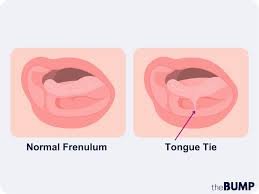Newborn Tongue Ties: What Parents Need to Know
By Lauren Eison
If you’ve heard the term “tongue tie” mentioned at your baby’s first checkup or while struggling through breastfeeding, understand that this is a more common topic than you realize. As a Newborn Care Specialist, I would say at least 30% of the babies I have worked with have a diagnosed tongue tie (including my 5 week old son). It’s a topic many new parents face, often with a lot of questions.
What is it? Should it be treated? Will it affect feeding? This post breaks it down in a clear, no-pressure way to help you understand what tongue ties are and what your options may be.
What is a Tongue Tie?
Tongue tie, or ankyloglossia, is when the thin piece of tissue under a baby’s tongue (called the lingual frenulum) is too short, tight, or thick. This restricts how freely the tongue can move.
While all babies are born with a frenulum, in some cases, it can interfere with normal activities — especially feeding.
Why Does It Matter?
In newborns, tongue ties are most often noticed because of breastfeeding or bottle-feeding difficulties. Babies with a tongue tie may have trouble:
Latching deeply or staying latched
Gaining weight at a healthy pace
Transferring enough milk
Making a strong seal around the nipple
Feeding without making clicking sounds or gasping for air
For nursing moms, this can mean painful nursing, cracked nipples, clogged ducts, or low milk supply due to inefficient feeding.
But not all tongue ties cause issues. Some babies with visible tongue ties feed perfectly well. Others may show subtle signs that take a few days or weeks to notice.
Signs to Watch For
You or your pediatrician might suspect a tongue tie if:
Baby has a shallow latch or falls off the breast often
Feeds are very frequent, long, or exhausting
You hear clicking or smacking sounds during feeds
Baby is unusually gassy or fussy after eating
Baby struggles to stick their tongue out or lift it
Baby’s tongue looks heart-shaped when they cry
What Can Be Done?
If a tongue tie is suspected, your pediatrician or lactation consultant may refer you to a specialist — often a pediatric ENT (ears, nose, throat specialist), dentist, or oral surgeon — for an evaluation.
I’ve seen a few babies have minor tongue ties that did not need revision. If treatment is recommended, it usually involves a simple procedure called a frenotomy or frenectomy, where the tight tissue is quickly released using sterile scissors or a laser. This can often be done in-office, and for newborns, it takes just seconds.
Some parents notice an immediate improvement in feeding; others see gradual progress over several days or weeks, especially with feeding support.
To Clip or Not to Clip?
It’s a personal decision. Some things to consider:
You might choose to treat if:
Feeding is painful, inefficient, or not improving
Baby is struggling to gain weight
You’ve worked with a lactation consultant and still see issues
You want to prevent possible future speech or dental problems
You might choose to wait if:
Baby is feeding and gaining weight well
Tongue mobility is good despite the tie
You prefer a conservative, wait-and-see approach
There is no right or wrong answer on what you choose. Find professionals who support your goals to educate you on your specific case.
The Role of Lactation Support
Whether or not you pursue treatment, working with a certified lactation consultant (IBCLC) can is something I always will recommend to my tongue-tie parents. They can assess latch, recommend techniques or tools, and guide you through recovery if a procedure is done.
In many cases, feeding can improve significantly with the right help — even without surgery. Harmony has great lactation consultants on our team, and a convenient resource list if needed.
Final Thoughts
If you’re dealing with a suspected tongue tie, take a deep breath. You’re not alone, and you’re not doing anything wrong. Newborns come with a lot of learning curves - especially when it comes to feedings. I know a tongue-tie can seem like a large bump in the road, but I’ve never personally seen an adult with a tongue tie who can’t eat or drink properly.
Be gentle with yourself. Ask questions. Get support. Go to the “Contact Us” section to gain access to our fabulous team or my lovely personality.
Harmony Baby Concierge is a full service Newborn Care + Postpartum Support Agency based in Dallas, Austin and Houston, Texas.. We have a well-rounded team of Newborn Care Specialists, Night Nurses, Postpartum Doulas, Newborn Night Nannies and Baby Nurses. We provide lactation support, newborn care, night nursing, gentle sleep training and parent education to families of newborns. We serve all families with love, warmth and care. Serving: Dallas, Austin, Houston, Highland Park, University Park, Kessler Park, Lake Highlands, Lakewood, Plano, Frisco, Celina, Prosper, Fort Worth, Southlake, Westlake, Irving, Preston Hollow, Park Cities, Grand Prairie, Carrollton, Houston, Manvel, Galveston, West University, Austin, Barton Creek, Round Rock, Houston, Denver, New York City, Greenwich CT, Manhattan, Brooklyn, Englewood Colorado, Cherry Hills Village CO, and Surrounding Areas.



